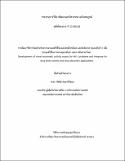บทคัดย่อ
โรคเอดส์ยังคงเป็นปัญหาสาธารณสุขที่สาคัญของประเทศไทย ปัจจุบันการรักษาโรคเอดส์จะใช้สูตรยาต้านไวรัสที่เรียกว่า highly active retroviral therapy หรือ HAART โดยสูตรยาดังกล่าวสามารถยับยั้งการเพิ่มจำนวนของไวรัส และช่วยรักษาระดับของเซลล์ CD4+ lymphocyte ไม่ให้ลดลง การได้รับยาต้านไวรัสอย่างสม่ำเสมอทำให้สามารถควบคุมปริมาณไวรัสให้อยู่ในระดับที่ผู้ป่วยสามารถดำรงชีวิตได้อย่างปกติ แต่ในทางตรงกันข้ามหากผู้ติดเชื้อมีการรับประทานยาที่ไม่สม่ำเสมอก็จะก่อให้เกิดการกลายพันธุ์ของเชื้อไวรัส และจำเป็นต้องเปลี่ยนสูตรยาใหม่ ซึ่งจะทำให้มีต้นทุนในการรักษาที่เพิ่มขึ้น ดังนั้น การตรวจหาระดับยาและการคัดสรรหาตัวยาต้านไวรัสตัวใหม่ที่มีประสิทธิภาพในการรักษาที่ดีจะเป็นหนทางหนึ่งที่จะช่วยทำให้การรักษามีประสิทธิภาพมากขึ้น ดังนั้นวัตถุประสงค์หลักของการทำวิจัยนี้คือ การมุ่งเน้นที่จะสร้างชุดตรวจสอบคุณภาพของยาต้านไวรัสในกลุ่ม protease inhibitor และ integrase inhibitor แบบ in vitro biological activities ซึ่งยังไม่มีรายงานมาก่อน ในรูปแบบ high-throughput assay โดยจะนำไปตรวจพยากรณ์ระดับยา protease inhibitor ชนิดต่างๆ ในกระแสเลือดด้วยหลักการอิมมูโนโครมาโทกราฟีที่เข้าถึงได้ง่าย และไม่ต้องเปลี่ยนชุดตรวจเมื่อเปลี่ยนตัวยา อีกทั้งยังสามารถอ่านผลทดสอบได้ด้วยตาเปล่า ทั้งนี้เพื่อติดตามความสม่ำเสมอในการรับประทานยา (drug adherence) ในขณะที่ชุดตรวจหา integrase activity แบบใหม่จะสามารถทำได้ง่ายด้วยเทคนิคเรียลไทม์พีซีอาร์โดยไม่จำเป็นต้องใช้สารรังสีตามที่เคยที่ใช้กันในอดีต ทำให้ลดปัญหาเรื่องการกำจัดขยะรังสีซึ่งมีอันตรายต่อคนและสิ่งแวดล้อม โดยผู้วิจัยหวังว่าจะนำชุดตรวจหา protease activity และ integrase activity อย่างง่ายนี้ไปประยุกต์ใช้ในการตรวจคัดกรองหายา หรือสมุนไพรตัวใหม่ๆ ที่มีฤทธิ์ยับยั้งเอชไอวีโปรตีเอสและอินทิเกรสที่เหมาะกับไวรัสสายพันธุ์ต่างๆ ของผู้ติดเชื้อในอนาคต ซึ่งองค์ความรู้นี้จะนำไปสู่การค้นพบยาใหม่ที่ถูกคิดค้นโดยคนไทย รวมไปถึงอาจจะสามารถลดการนำเข้าของยาใหม่ และจะนำไปสู่การลดอัตราการเกิดโรคอุบัติใหม่ได้ในอนาคต
บทคัดย่อ
Acquired immune deficiency syndrome (AIDS) remains a major public health problem in Thailand. Treatment of HIV-infected patient using highly active retroviral therapy (HAART) can suppress viral replication and increases maintain the level of CD4+ lymphocyte cells. Adherence to HAART can improve health and prolong life of HIV-infected patients. However, non-adherence to antiretroviral drugs leads to develop of HIV drug-resistance strains. Therefore, the high costs of new generation antiretroviral drugs are needed. In this study, we aimed to develop a high throughput assay for examining the enzymatic activity of HIV-1 protease (PR) and integrase (IN). These assays will be applicable for assessing the level of HIV-1 protease inhibitors (PIs) and integrase inhibitors in HIV-infected patients who recived antiretroviral treatment. The novel immunochromatographic (IC) strip test for determining of HIV-PR activity was developed by combining proteolysis activity of HIV-PR and an immunochromatographic reaction. This IC strip could adaped to evaluate the biological activity of PI and also semi-quantify the level of PI in HIV-1 infected individual. Furthermore, we established a non-radioisotopic testing based on real-time polymerase chain reaction (PCR) assay to determine HIV-1 integrase activity. This assay has been shown to be effective and inexpensive for a high-throughput screening of novel IN inhibitors. The novel development of enzymatic activity assay of HIV-1 protease and integrase using immunochromatographic strip test and real-time PCR assay could provide as a high-throuput screening platform for discovering new synthetic antiretroviral agents or natural compounds from Thai medicinal plants by Thai reseacher. This study might be able to reduce the importion of new generation antiretroviral drugs from other countires.


